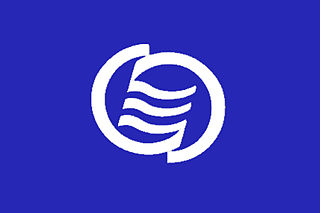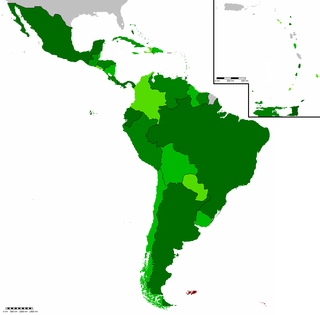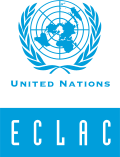Raúl Prebisch was an Argentine economist known for his contributions to structuralist economics such as the Prebisch–Singer hypothesis, which formed the basis of economic dependency theory. He became the executive director of the Economic Commission for Latin America in 1950. In 1950, he also released the very influential study The Economic Development of Latin America and its Principal Problems.

The United Nations Economic and Social Commission for Asia and the Pacific (ESCAP) is one of the five regional commissions under the jurisdiction of the United Nations Economic and Social Council. It was established in order to increase economic activity in Asia and the Far East, as well as to foster economic relations between the region and other areas of the world.

The Association of Caribbean States is an advisory association of nations centered on the Caribbean Basin. It was formed with the aim of promoting consultation, cooperation, and concerted action among all the countries of the Caribbean coastal area. The primary purpose of the ACS is to promote greater trade between the nations, enhance transportation, develop sustainable tourism, and facilitate greater and more effective responses to local natural disasters.
Armando Di Filippo is an Argentine economist, an economic science faculty member at the University of Rosario and Magíster in economic science at the University of Chile.

The Andean Parliament is the governing and deliberative body of the Andean Community, conformed by representatives of its four member states Bolivia, Colombia, Ecuador and Peru, and one associate member, Chile. It is composed of 25 parliamentarians, five representing each state.

Alicia Isabel Adriana Bárcena Ibarra is a Mexican biologist currently serving as her country's Secretary of Foreign Affairs. She previously served as the Executive Secretary of the United Nations Economic Commission for Latin America and the Caribbean (ECLAC) from July 2008 to March 2022.

Pedro Vuskovic Bravo was a Chilean economist of Croatian descent, political figure, minister and author of the economic plan implemented by Salvador Allende during his government called the Vuskovic plan. His economic policies were used by economists Rudi Dornbusch and Sebastian Edwards to coin the term macroeconomic populism.

Gert Rosenthal Königsberger is a Guatemalan diplomat.

Rebeca Grynspan Mayufis is a Costa Rican economist who has been serving as Secretary General of the United Nations Conference on Trade and Development (UNCTAD) since 13 September 2021.

CAF - development bank of Latin America and the Caribbean, formerly the Andean Development Corporation, is a development bank whose mission is to promote sustainable development and regional integration in Latin America and the Caribbean, through the financing of projects of the public and private sectors, the provision of technical cooperation and other specialized services.

The Community of Latin American and Caribbean States (CELAC) is a regional bloc of Latin American and Caribbean states proposed on February 23, 2010, at the Rio Group–Caribbean Community Unity Summit, and created on December 3, 2011, in Caracas, Venezuela, with the signing of the Declaration of Caracas. It consists of 33 countries in Latin America and the Caribbean and has five official languages.
eLAC in international relations, is an intergovernmental strategy that conceives of information and communications technologies (ICTs) as instruments for economic development and social inclusion in Latin America and the Caribbean. It is based on a public-private sector partnership and is part of a long-term vision in line with the Millennium Development Goals (MDGs), those of the World Summit on the Information Society (WSIS), and now, the Sustainable Development Goals (SDGs). It contributes to the implementation of these long-term goals by pursuing a consecutive series of frequently adjusted short-term action plans with concrete qualitative and quantitative goals to be achieved.
José Antonio Mayobre was a Venezuelan economist who worked as an academic economist, a diplomat and international civil servant. He was a Minister of Finance of Venezuela and the Executive Secretary of the ECLAC.

The Group of Latin America and Caribbean Countries, or GRULAC, is one of the five United Nations Regional Groups composed of 33 Member States from Central and South America, as well as some islands in the West Indies. Its members compose 17% of all United Nations members.

Hernán Santa Cruz was a Chilean lawyer and diplomat, Chile's first delegate to the United Nations and one of the nine original drafters of the Universal Declaration of Human Rights, one of the most relevant documents of humanity.

The term Latin America and the Caribbean (LAC) is an English-language acronym referring to the Latin American and the Caribbean region. The term LAC covers an extensive region, extending from The Bahamas and Mexico to Argentina and Chile. The region has over 670,230,000 people as of 2016, and spanned for 21,951,000 square kilometres (8,475,000 sq mi).

The Library of the Economic Commission for Latin America and the Caribbean was established in 1948 as part of the creation of the Economic Commission for Latin America and the Caribbean; this coincided with the inauguration of the Economic Commission for Latin America by the United Nations, in support of its mandate in the region. The Library has four branches: the Hernán Santa Cruz Library in Santiago, the Centro de Recursos de Información y Distribución de Documentos in México D.F., the Raúl Prebisch Library in Brasilia and the Caribbean Knowledge Management Centre in Port of Spain. These four form the ECLAC Library.

The Regional Agreement on Access to Information, Public Participation and Justice in Environmental Matters in Latin America and the Caribbean, better known as the Escazú Agreement, is an international treaty signed by 25 Latin American and Caribbean nations concerning the rights of access to information about the environment, public participation in environmental decision-making, environmental justice, and a healthy and sustainable environment for current and future generations. The agreement is open to 33 countries in Latin America and the Caribbean. Of the 25 signatories, it has been ratified by fifteen: Antigua and Barbuda, Argentina, Belize, Bolivia, Chile, Ecuador, Grenada, Guyana, Mexico, Nicaragua, Panama, Saint Vincent and the Grenadines, Saint Kitts and Nevis, Saint Lucia, and Uruguay.

Carlos Martínez Sotomayor was a Chilean lawyer, academic, diplomat and politician. He served as Minister of Foreign Affairs during the government of President Jorge Alessandri.

















